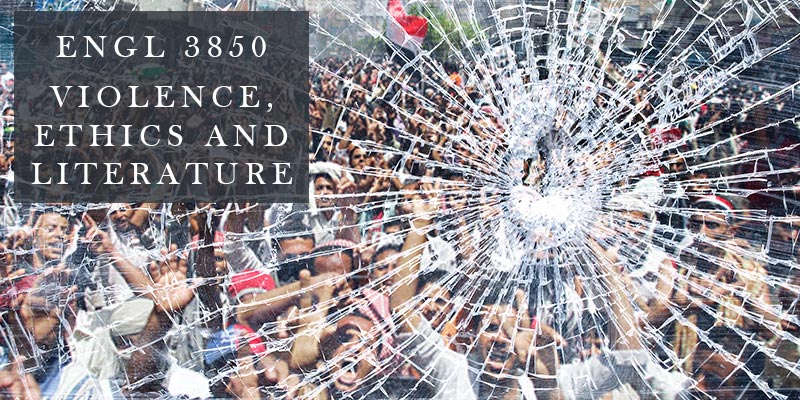Catalog Description
Prerequisites: Completion of Blocks A and B4, an additional course from Block B, and at least one course each from Blocks C and D. Thematic and critical examination of representations of violence in literature. Will consider violence across historical, racial, sexual, generational, and cultural boundaries. UD GE C (cl)
Course Description
Focusing on conflict zones such as Africa, South Asia, and the Middle East, this course will introduce students to a wide selection of literary texts that portray violence in its myriad manifestations (colonial, racial, sexual, political, cultural, and religious). Where does violence come from, the course will ask? Why do people commit acts of violence? How are they different from the rest of us? When is violence legitimate? What counts as violence? While examining a variety of literary genres (testimony, fictional autobiography, escapee narrative, psycho-political thriller, magical realist fiction, etc.), students will be able to understand violence not simply as one of the most enduring human impulses but also as a historically determined event that places deeply ethical claims on its witnesses. In other words, students will have the opportunity to engage with several questions related specifically to the ethical implications of witnessing and representing violence: What does it mean to bear witness to the violence done to others? How do we represent violence and who gets to represent it? What happens when stories of pain and loss become literary commodities used to confirm certain stereotypes about particular cultural communities? Such are the questions, amongst others, that the students will address both in their analysis of the texts selected and in their final community-based project. Ultimately, the course is designed to show students the ways in which literature reflects the traumas of violence and suffering and potentially intervenes in the social, political, and cultural systems that cause them. Topics covered in the course may include, but are not limited to, violence and narrative ethics, geographies of pain, ethics of terrorism and counter-terrorism, precarity and justice, etc.
ENGL 3850 includes a civic learning/civic engagement component.
Learning Outcomes
Upon completion of this course, students will be able to
- read critically specific literary narratives of violence in terms of their historical and cultural contexts
- reflect critically on the various manifestations and motivations of violence across different cultures
- identify and engage with the ethical implications of committing as well as witnessing acts of violence
Upon completion of the community engagement component, students will be able to
- connect academic learning/disciplinary knowledge and civic participation
- demonstrate understanding of their impact on their respective physical, social and cultural environments and how such environments impact them
- demonstrate knowledge of ways to make change in local and global communities
- collaborate with others in order to develop and implement an approach to a civic issue
Course Outline
The content and focus of the class depends on the individual faculty member teaching it and can engage with literary texts from antiquity up to the present. The following is one potential manifestation of the course outline:
Week 1: Overview of course content and goals
Week 2-3: Khalid Husseini, The Kite Runner (Afghanistan)
Week 4-5: Salman Rushdie, Shalimar The Clown or Shame (India)
Week 6-7: Buchi Emecheta, The Joys of Motherhood (Nigeria)
Week 8-9: Hisham Matar, In the Country of Men (Libya)
Week 1-12: Fadia Faqir, Pillars of Salt (Jordan)
Week 13-14: Rawi Hage, De Nero’s Game (Lebanon)
Week 15: Yasmina Khadra, The Sirens of Baghdad (Iraq)
About the Banner: Protesters in Yeman, photo credit Khaled Abdullah/Reuters (image from http://www.csmonitor.com/USA/Foreign-Policy/2011/0512/Why-is-US-so-quiet-as-regimes-crack-down-on-Arab-Spring-protesters)
